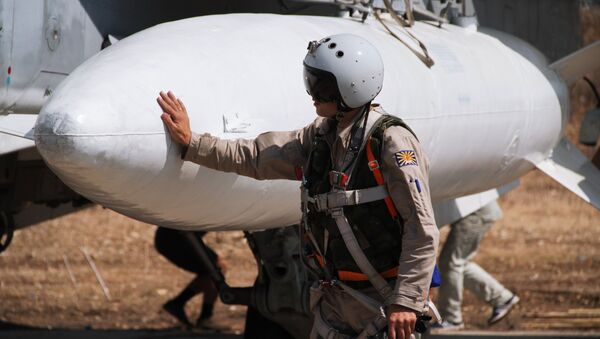In September 2014, Kenneth M. Pollack, a former CIA intelligence analyst, proposed a plan entitled "An Army to Defeat Assad." The CIA analyst envisaged the creation of a US Syrian proxy army that would take over the Syrian government forces (and deal a blow to Islamic State). However, the toppling of Bashar al-Assad was marked by Pollack as the overriding priority.
"Once the new army gained ground, the opposition's leaders could formally declare themselves to represent a new provisional government. The United States and its allies could then extend diplomatic recognition to the movement, allowing the US Department of Defense to take over the tasks of training and advising the new force – which would now be the official military arm of Syria’s legitimate new rulers," Pollack elaborated.
So, nothing hinted at any trouble until September 30, when Russia suddenly threw a wrench in Washington's ingenious plan.
"To get to the root of the current crisis in Syria and the Middle East overall, we must look at US policy overall," Germany-based American political analyst Phil Butler explained in an exclusive interview to Sputnik.
"The current divisions within Syria and Northern Iraq are to a degree fabricated. Secular, religious, and even tribal differences in this region have been leveraged for centuries to divide Syria, as well as other nations in the region. You've mentioned Ken Pollack, and appropriately, I might add. Pollack, who's held many official positions within the Washington policy making establishment, is actually one of the authors of chaos in this region. Discussing such "bred" academics is a deep well, but suffice it to say the division of Yugoslavia, the wars in Iraq and Afghanistan, the Arab Spring overall, the Georgia war, and the current Ukraine mess are all facets of the same flawed gem of US hegemony," the analyst told Sputnik.
According to Butler, Washington's mission in Syria is intended to be a splintering as we saw with Kosovo, in the Balkans.
"As for the 'plan' in Syria, I believe there were 'contingencies' mapped out. As amoral as these schemes may be, they are not concocted by idiots. Contingency 1, in my view, was the literal overthrow of Assad. Vladimir Putin's moves, Russia's, have thwarted this potential at every turn. Contingency number two obviously involves another Yugoslavia in the making. And finally, overall tribalism and chaos in the region helps the US, and particularly Israel gain strength in the region by weakening neighbors," the political analyst stressed.
However, Middle East Eye reported on October 14 that there is no sign of such preparations on the ground: "The US-led anti-IS coalition dropped 50 tons of weapons to the newly created Syrian Arab Coalition on Monday in the Hasakah province, in order to avoid angering Turkey. But so far, no US weapons can be seen on the frontlines close to Raqqa, nor any sign of rebel troop preparations."
"The reason we have not seen these latest weapons shipments being used, is the complexity of strategy on the ground has changed. No standing force, Al-Nusra, ISIL, or other jihadists put together, could withstand Russian air power. I believe we are about to see Assad's opposition morph their strategy to full guerrilla warfare as was the case in Afghanistan. We will see fewer conventional "offensives" in the future, and far more localized attacks, the Pentagon will try and create another Afghanistan," Butler explained commenting on the issue.
However, in contrast to the US' covert war against the USSR in Afghanistan, there were no US jet fighters in the region and thus far, no threat of a direct confrontation between the two global powers.
Today, there are many military "actors" in the skies of Syria and Iraq. Does it mean the Pentagon's Afghani strategy may unexpectedly transform into a direct confrontation between US/NATO and Russia?
"As for the threat of direct confrontation between the US and Russia in Syria, the possibility does exist. In this case however, I believe such a confrontation is actually another contingency for Washington," the American political analyst underscored.
"While US military doctrine these days is set to avoid direct confrontation, on the other hand America and citizens in the "West" have been primed for it. Consider that most Americans, have been brainwashed substantially to believe Vladimir Putin has already invaded half a dozen countries. As crazy as this sounds, pretend you live in small American town and you listen to CNN or Fox before bed every night. This potential, to be dragged into a wide conflagration set up by Washington, is why you see Vladimir Putin making very conservative and precise moves on the stage," he told Sputnik.
"Having said this, given all we have seen since 9/11, it would take a fairly major incident to excuse such a confrontation," Phil Butler concluded.





